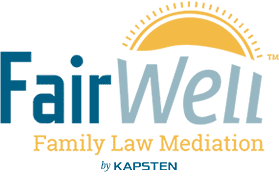Divorce Mediation
FairWell, The Path to a Better Divorce
Contact Us to Get Started
Divorce Mediation Attorneys in Minnesota
Marriage is a legal relationship that is regulated by state law. As a corollary, state courts are responsible for issues regarding the termination of that legal relationship. Thus, Minnesota courts are tasked with the job of presiding over litigation concerning divorce.
Divorce proceedings can be very complicated, as they often involve different legal issues arising under Minnesota family law. As a result, the divorce process generally demands assistance from a legal professional with a sophisticated understanding of the substantive laws and procedural rules governing divorce issues in Minnesota.

Divorce doesn’t have to be so complex, though. If you and your spouse both want a divorce and are in agreement about the terms of your separation, then our team can help you get an easy and quick divorce in Minnesota.
Mediation As an Alternative to Divorce
As an alternative to conventional litigation, many divorce cases are privately settled through mediation proceedings.
In Minnesota, divorce mediation is an alternative form of dispute resolution that promotes cooperation and compromise between the parties, resulting in a simple and fast divorce in most cases. The parties can discuss and negotiate divorce issues under the guidance of a neutral third party, known as a mediator. Mediators are often legal professionals with experience in divorce matters—such as attorneys and retired judges.
What Does Divorce Mediation Involve?
Generally, divorce mediation cases involve the following matters:
- Division of Marital Assets & Liabilities: When a couple gets divorced, they must determine who is allocated the assets and liabilities they acquired during their marriage. Minnesota is not a community property state. Minnesota is an equitable distribution state when it comes to dividing marital property and debts upon divorce. This means that marital property and obligations are not necessarily equally divided 50/50 like they might be in a community property state. Instead, courts consider various factors in how to “equitably” apportion the property in question.
- Spousal Maintenance: In divorce cases, one spouse might not have sufficient financial resources to cover their living expenses after their marriage ends. Under Minnesota law, such a spouse may be entitled to financial assistance from their former spouse—known as “spousal maintenance,” “spousal support,” or “alimony.”
- Child Custody: If a divorcing couple had a child together who has not reached adulthood by the time of their separation, they must determine their respective rights and responsibilities regarding the child’s physical care and upbringing.
- Child Support: In all cases the parents have a duty to provide their child with financial support.
Mediation Costs Less Than Contested Divorce – Call (320) 299-4249 Now
Mediation – Helping You Keep Sight of What's Most Important
Divorce inherently involves situations where an important personal and legal relationships—a marriage—has come to an end. Often, what was once considered to be a strong relationship is at its most vulnerable time, as the parties must navigate the legalities of terminating their marriage. This can affect other relationships too—namely the parent-child relationship in cases involving minor children.
The American civil justice system is predicated on the parties contending to promote and preserve their respective interests. This is an adversarial system where the litigants are essentially competing against each other to protect their legal rights and interests; however, the adversarial system of litigation has been shown to exacerbate conflict between family members in family law cases.
Given the very personal nature of divorce, it is easy for the parties to lose sight of what is most important to themselves and their families as they strive to “win” their case. This can result in protracted and expensive courtroom battles. In many cases, a party may “win” the case, but ultimately lose thousands of dollars in attorney’s fees and court costs.
The Divorce Mediation Process
Generally, a mediated divorce will go through the following five stages:
Introductory Stage – During the first stage, you and your spouse provide the divorce mediator with background information about your case and the mediator will outline how the meetings will be conducted.
Information-Gathering Stage – The divorce mediator will likely begin to discuss the general legal rules that may apply to your case. The mediator will also ask you and your spouse to bring in financial documents (tax returns, bank and mortgage statements, etc.). The purpose of this stage is for you and your spouse to have all the facts and information you need to negotiate a legally binding agreement that you won’t regret signing.
Framing Stage – Each spouse outlines their reasons for wanting certain outcomes in the settlement, i.e., their “needs and interests,” in order to help the divorce mediator find a resolution that successfully addresses each of the spouse’s priorities.
Negotiating Stage – Once the mediator has helped the spouses frame their issues and interests, it is time to negotiate an acceptable settlement by providing all possible options.
Concluding Stage – A tentative agreement is put into writing and provided for both spouses to review. Many mediators will also prepare the formal settlement agreement that will be filed with the court.
What Is the Benefit of Divorce Mediation?
- Living arrangements or relocation;
- Efficiency: Divorce mediation can be a form of quick divorce in MN. Mediation is an informal process that is not restricted by rules of procedure. As a result, the parties can resolve important divorce issues at their own pace. This can be potentially expedited for cases where the parties find common ground and a mutual understanding of each other’s interests and goals.
- Control: During mediation, the parties drive negotiations and discussions. Since mediation is typically an informal proceeding conducted privately, the parties are not subject to the often congested dockets and schedules of the public courts.
- Convenience: Mediation proceedings do not have to take place in a courtroom. Typically, the parties get to choose when and where a mediation session will take place. The parties can resolve their dispute from the comfort of a private conference room.
Is Divorce Mediation Faster Than a Traditional Divorce?
Mediation is typically faster than going to divorce court, but the actual length depends on several factors, such as the amount of assets you have; how many issues need to be discussed (and how willing you are to compromise on these issues); and whether child custody is involved.
Is Divorce Mediation More Affordable Than a Traditional Divorce?
In general, divorce mediation is cheaper than a contested divorce. This is because, in a mediated divorce, you and your spouse both want a simpler, quick divorce and are willing to work out an agreement without going to trial. This prevents your divorce case from being drawn out by busy court schedules, which in turn saves you money in attorney fees as well as court fees. In the end, mediation is generally cheaper than divorce court.
Divorce Mediation Lawyers Serving the Twin Cities & All of Minnesota
If you are confronted with the prospect of divorce and are concerned about the costs and challenges of litigation, there are alternative options for you. At FairWell Family Law Mediation, our divorce mediators near you can advise you about the benefits of mediation and whether the process is appropriate for your case.
Related Reading:
Why Choose FairWell Family Law Mediation?
Timely Results
We understand that divorce can become a lengthy process. Our priority at FairWell is to help give you peace of mind by helping to make your divorce as efficient and as quick as possible.
Automated Technology
Our state of the art FairWell document creation system makes it so that we are able to provide our clients with fixed pricing, error-free court documentation, and a faster divorce process.
Experienced Mediators
Our FairWell Guides have decades of collective experience in successfully guiding couples through our divorce mediation process and helping them come to an agreement.
Fixed Prices
We understand the financial burden and stresses of a divorce. Our goal at FairWell is to help give you peace of mind in knowing that a divorce is possible without the stresses of unknown expenses.

Experienced Mediators
Our FairWell Guides have decades of collective experience in successfully guiding couples through our divorce mediation process and helping them come to an agreement.
Fixed Prices
We understand the financial burden and stresses of a divorce. Our goal at FairWell is to help give you peace of mind in knowing that a divorce is possible without the stresses of unknown expenses.








